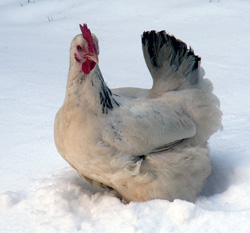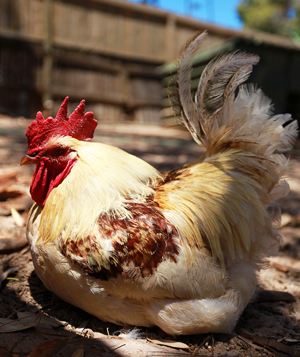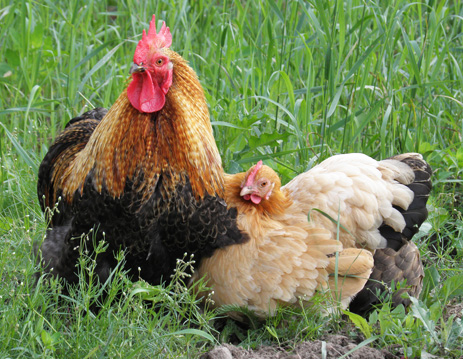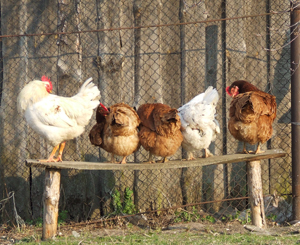I’ve been thinking about plans for chicken coops and keeping the ladies warm in the winter. Last year it got really cold just before Christmas and although I know chickens are tough old birds, I wouldn’t want them freezing their little feathers off!
 I know, it’s only late June, but you need to plan ahead right? Well anyway, it was on my mind so there you are. You can always come back and read this again when the frosts arrive 😉
I know, it’s only late June, but you need to plan ahead right? Well anyway, it was on my mind so there you are. You can always come back and read this again when the frosts arrive 😉
Most of the designs for chicken coops I’ve seen are pretty good. The free chicken coop plans usually leave something to be desired (not surprisingly as they probably couldn’t put the time and detail in that a professional can) but nobody really gets into heating or insulation.
So I had a bit of a search around, as you do. I was initially looking for chicken coop heaters. There are plenty around. Some are ceramic things you plug in like a light bulb – apparently a lot of reptile keepers use them. They can get very hot – like 200+ degrees F. I’m not sure that wouldn’t be a fire risk. Then I found some heated panels – which look great, and safe, but they need to be plugged in and they start at over 50 bucks (if you know of cheaper ones, please let me know).
So then I thought about insulation, and found some great advice over at Chicken Keeping Secrets. It boils down to this:
Like I said before, chickens can take it pretty rough. In either hot or cold conditions they will do OK so long as they have water. That’s not to say they’ll be fine in all conditions, but minus a couple of degrees won’t harm them – they’ll just all cuddle up together for warmth.
If you want to give them some heat, they’ll probably be happier for it – but it probably won’t change the number of eggs they lay in winter – which is more effected by how light the days are than by heat.
If you want to insulate, that can also be a good idea but it’s really important to seal all the insulation in – because chickens will attempt to eat more or less anything. Now I like chickens, but they aren’t the smartest creature ever. They’ll peck at fiberglass, rockwool, or whatever you use – and won’t be able to tell if it’s toxic so they can do themselves a lot of harm.
The other reason to make sure that insulation is well sealed in is parasites. All kinds of bugs will live in it if they can. Some your hens will eat but others, like fleas and ticks, can make your ladies very uncomfortable.
I thought it was a really useful piece, and there’s plenty more great chicken keeping advice so I’ll certainly be keeping Chicken Keeping Secrets on my favorites list.
 I wondered whether this was a good idea or not. Mine have always been on the ground – with the roosting area raised so at night my birds are out of harm’s way.
I wondered whether this was a good idea or not. Mine have always been on the ground – with the roosting area raised so at night my birds are out of harm’s way.
 The first is air flow. Ventilation if you like. If you’ve ever been passed a big commercial chicken farm, chances are you knew it about half a mile before and some considerable time after. Now I’m as big a fan of chickens as anyone else, but if there’s not enough air flow provided by your chicken coop plans, those ladies are going to smell. Hey, it’s not their fault, they perspire like the rest of us and they’ve got a need to go to the toilet too! Sadly chickens can’t get out a can of air freshener so we have to give them all the help we can. Of course in winter you still want them to be snug and warm so in an ideal world you want designs for chicken coops that incorporate vents or windows that you can open when it’s hot. It’s best to have these on a side that isn’t into the prevailing wind. Those ladies like a refreshing breeze – not a nasty draught up their… feathers.
The first is air flow. Ventilation if you like. If you’ve ever been passed a big commercial chicken farm, chances are you knew it about half a mile before and some considerable time after. Now I’m as big a fan of chickens as anyone else, but if there’s not enough air flow provided by your chicken coop plans, those ladies are going to smell. Hey, it’s not their fault, they perspire like the rest of us and they’ve got a need to go to the toilet too! Sadly chickens can’t get out a can of air freshener so we have to give them all the help we can. Of course in winter you still want them to be snug and warm so in an ideal world you want designs for chicken coops that incorporate vents or windows that you can open when it’s hot. It’s best to have these on a side that isn’t into the prevailing wind. Those ladies like a refreshing breeze – not a nasty draught up their… feathers. 1. Let’s look at fence design. Whether you’re considering chicken coops with runs, or just the general fencing of the area where you’ll keep your hens, a strong fence or enclosure is vital for their safety. Sadly there are lots of beasts – and a few birds – that will happily make a meal of your chickens or their eggs. Don’t spend ages on the hen house then short cut the fence.
1. Let’s look at fence design. Whether you’re considering chicken coops with runs, or just the general fencing of the area where you’ll keep your hens, a strong fence or enclosure is vital for their safety. Sadly there are lots of beasts – and a few birds – that will happily make a meal of your chickens or their eggs. Don’t spend ages on the hen house then short cut the fence. Then I started thinking about used chicken coops a bit more, so here are a few pros and cons. This is just my opinion of course, but you might want to consider it all the same – if you disagree, by all means have your say 😉
Then I started thinking about used chicken coops a bit more, so here are a few pros and cons. This is just my opinion of course, but you might want to consider it all the same – if you disagree, by all means have your say 😉 I know, it’s only late June, but you need to plan ahead right? Well anyway, it was on my mind so there you are. You can always come back and read this again when the frosts arrive 😉
I know, it’s only late June, but you need to plan ahead right? Well anyway, it was on my mind so there you are. You can always come back and read this again when the frosts arrive 😉